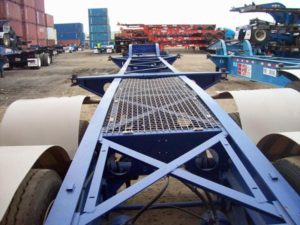 With all the talk about supply chain issues and port congestion, unless you’re in the transportation industry, you may not have given a lot of thought to intermodal equipment depots. These are the facilities and the people who work to store and maintain the chassis, trailers, and trucks necessary to keep the flow of goods moving.
With all the talk about supply chain issues and port congestion, unless you’re in the transportation industry, you may not have given a lot of thought to intermodal equipment depots. These are the facilities and the people who work to store and maintain the chassis, trailers, and trucks necessary to keep the flow of goods moving.
What is the role of the Intermodal Equipment Depot in the Supply Chain?
Intermodal equipment depots are important links in the supply chain. In the logistics industry, depots store and repair the heavy equipment required to move large volumes.
Intermodal equipment depot’s store, maintain, repair, and dispatch equipment as directed by internal or customer Fleet Operations Managers. Think of depots as large warehouses containing industrial sized maintenance bays as well as frequently needed parts and tools for equipment repair. The surrounding fenced in yards store stacked chassis, parked trailers, intermodal containers, and tank containers while these units are not being used for the transportation of goods. Trucking.org estimates that there were 3.97 million Class 8 trucks (including tractors and straight trucks) in operation in 2020, up 1.5% from 2019. This number continues to increase, particularly over the past two years. This means there is a lot of equipment which has to be managed and maintained. The type of equipment available, its age, location, and condition directly impact the cost and speed of transport.
What Challenges are Intermodal Equipment Depots Facing?
Depots are often located near major shipping ports, airports, and railroad terminals in order to have transportation equipment readily available when shipments arrive. As ships and ports increase their capacity, new depots are being added with more space to maneuver equipment, expanded maintenance bays, and monitoring and tracking technology. However, the additional depot capacity often lags port expansion resulting in over-crowding and creating a material handling and logistics puzzle for the facility.
In addition to the need for space, intermodal equipment depots have another tough obstacle, the labor shortage. Depots employ mechanics, equipment safety inspectors, drivers, dispatchers, and other personnel, some of whom are required to have a valid CDL license. Finding qualified diesel mechanics and CDL drivers was difficult before the Covid pandemic. Filling important positions is an ever present challenge for depot managers. Particularly, hiring mechanics with training in specialized equipment such as chassis and trailers, in locations that serve as transportation hubs. Other in demand positions include welders and material handlers.
Adding to the challenges facing equipment depots is the difficulty and time required to obtain equipment parts. Tariffs have impacted sourcing for replacement steel parts. And even now, the time to acquire technological components sourced from countries shutdown by the pandemic has made repair schedules unpredictable. The labor and staffing shortages mentioned previously also delay repairs.
What Needs to Happen to Improve the Situation?
For intermodal equipment depots, challenges pertaining to space, parts, and labor are likely to continue. However, there are a couple of strategies that will improve the situation over time. The addition of new or the expansion of existing depots may alleviate some of the operational congestion. Though these gains could be offset by increasing volumes of goods and equipment.
Increasing domestic manufacturing for steel, ABS brakes, sensors, and other parts would improve the reliability of access to chassis frames and components and shorten the time for delivery. Routine maintenance and periodic safety inspections supported by technology are also improving the reliability of equipment and preventing a small repair from becoming a larger and longer one.
Staffing shortages may be the biggest challenge for the transportation industry. Most of these jobs cannot be done remotely. Companies are emphasizing employee safety, partnering with technical schools and colleges, and providing on-the-job training to expand and retain employees.
How can Penn Intermodal Leasing help?
Penn Intermodal Leasing understands the challenges facing intermodal equipment depots and supports our industry associates to keep the supply chain moving during the busy holiday season. Together we are working to provide chassis to move liquid bulk products. Find out more about our tank container chassis models and availability. For more information call us at 888-909-PENN or contact us here.
Sources
- Conerly, Bill. “The Labor Shortage Is Why Supply Chains Are Disrupted.” Forbes, Forbes Magazine, 10 Dec. 2021, Accessed 19 September 2022.
- Goodman, Peter S. “How the Supply Chain Broke, and Why It Won’t Be Fixed Anytime Soon.” The New York Times, The New York Times, 22 Oct. 2021, Accessed 19 September 2022.
- LaRocco, Lori Ann. “The U.S. Supply Chain Is Now Facing Two Trade Hurdles.” CNBC, Accessed 19 September 2022.
- J.P.Morgan. “How Long Will the Chip Shortage Last? | J.P. Morgan Research.” Www.jpmorgan.com, 1 Dec. 2021, Accessed 18 September 2022.
- “NY-NJ chassis yard provides some interoperability.” Columbia Group, 25 October 2017,Accessed 28 September 2022.
- West, Darrell M. “Six Ways to Improve Global Supply Chains.” Brookings, 12 July 2022, Accessed 18 September 2022.

